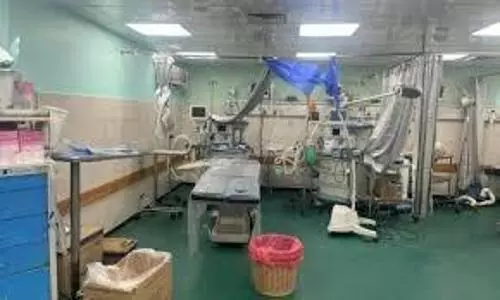
How safe is your ATM?
text_fieldsAutomated Teller Machines first developed by an American businessman Luther George Simjian enable the users easy access to their bank accounts and perform financial transactions without a bank teller.
ATM thefts have become rampant nowadays with crores of money robbed from the machines at several places either by breaking open the machine or using secret codes. In Kasargod and Thrissur, thefts were carried out using passwords. In both cases of ATM robbery, the staff working in private firms that had received the tender for filling cash in the machines and also the persons linked to them was found to be involved. Half of the ATMs in the country are reportedly, not safe at all with no CCTVs or security personnel employed at these counters. The first ATM was developed and built by Simjian in 1939; but was removed after 6 months due to lack of customer acceptance. Since then several refurbishments were made in the first model. In 1967, John Adrian Shepherd Barron developed a cash machine which was accepted by Barclays Bank. It installed the ATM machine in London. It was the first time an ATM machine was set up by a bank. New innovative measures were adopted in this field and the different ATMs were linked using network. HSBC (Hong Kong and Shanghai Banking Corporation) was the first to install ATM in India in 1987 at their Mumbai branch. British Bank of Middle East in 1992 set up Kerala’s first ATM machine in Thiruvananthapuram. There are reportedly 3.5 million Automated Teller Machines functioning in the world. In India, there are 1, 75, 000 ATMs belonging to the public sectors and private banks. These electronic machines have created a revolution in the field of service sectors providing the common man easy access to their money and freeing them of the trouble of waiting long hours at the banks for financial transactions.
The ATMs functioning 24*7 without any security personnel are at great risk of losing money any time. Each ATM in the country has the capacity to hold 25-50 lakh rupees. If the amount in a single ATM is supposed to be 20 lakh, the combined amount of money in all the ATMs in the country would come around to 35, 000 crore rupees. The immense amount of money in these machines is not secure and the Centre as well as the banks are to be held responsible for this. Earlier, the banks were responsible for filling the ATMs with money with two bank employees entrusted with its functioning. Therefore no complaints and concerns were raised before. But as part of the new policy of the government as well as the banks, private firms were entrusted with the job. These agencies gained easy access to the ATMs, able to open the machine any time using the secret code known only to them and the banks. The move snatched the control of ATMs from the banks eventually leading to rampant complaints of receiving fake currency, filling only the required ATM counters regularly and also pilfering of the money handed over by the banks for depositing into the machines. The control of the automated teller machines should be given back to the banks in order to ensure their safety and to steer clear of complaints. The State Bank of India and State Bank of Travancore had expressed deep concern over the ATM thefts and attempts for robbery. The bank authorities say that the problems would be solved to a small extent only if the firms be careful. They also provide suggestions like keeping the ATM cards and the PIN number safe and avoiding discarding the receipts at the counter after withdrawing cash. Expressing anxieties or providing suggestions alone would not help. Credibility being the most important merit of banks, they should ensure safety of the ATMs by taking over the job of filling the ATM machines with money. The private firms, if permitted to continue with the job entrusted, should be under strict surveillance.























